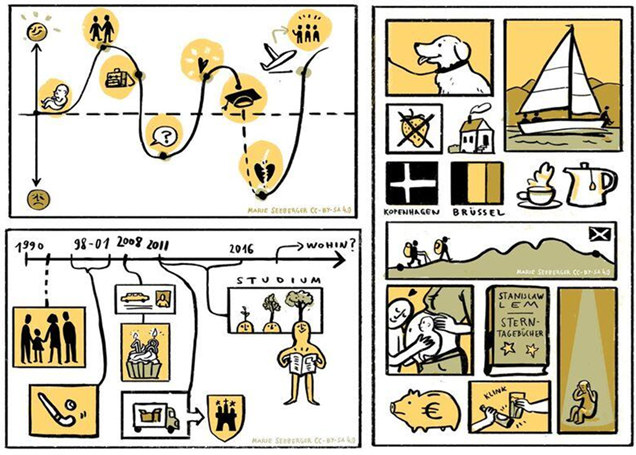After working through this session, you should be able to explain the different characteristics of culture and apply them to your personal cultural context. The following tasks will help you assess your learning.

Illustration: Marie Seeberger (www.behance.net/marieseeberger) CC-BY-NC-SA 3.0 license
Task: Biographical reflections
Look back at the course of your life and sketch out important steps, phases or situations which you think have had a strong influence on your cultural orientation. Once this is done, carry out the following tasks:
- Note down at least three collectives of which you are a member and characterise them.
- Note down what you have learned in the course of your life that is beneficial to what you are doing today.
- Choose one example and indicate in which context you gained specific knowledge and how.
- Give two examples of explicit and implicit knowledge that you have acquired in the course of your life.
Having completed this task, click on the following link to view an exemplary answer from one of our former students.
Show / hide sample answer
Name at least three collectives you are a member of and characterise them
My family (I have no brothers and sisters and growing up in a small family meant that I spent a lot of time with my parents. It was only when I went to the kindergarten that I came in close touch with other children and had to learn to share and be sociable. Another characteristic would be that we always shared a meal and talked a lot to each other. My father introduced me to the local football club and I started to appreciate playing football. What also characterises my family is that we still do many things together, even though I am a student now, we still go together on vacations, spend Christmas together and celebrate our birthdays)
My study group at the University (We are a group of three and started to learn together in term one and have grown quite close which means that we also talk about private issues, eat together and at time meet outside the university. Asked to characterise my study group I would say we are all pretty ambitious and are ready to share our knowledge and experiences. I would also say that we are all new in town and therefore enjoy exploring the city)
My friends from the kindergarten and primary school (Well, it is a long time since I went to the kindergarten and primary school in my home town. May be it is because I am single child that I still feel very attached to many of them. We try to meet during Christmas time and share the memory of our childhood but when I come to think about it, I think we also feel close because of the things we learned and the values which are important to us)
What have you learned in the course of your life that is beneficial to what you are doing today?
Apart from knowledge such as reading and writing, speaking different languages, math and many other subjects norms of behaviour are critical. For example the general etiquette like how to be polite, greet someone, behaving in the classroom is beneficial when studying. I also feel that having learned to concentrate and how to deal with texts are pretty important. May be also having a general knowledge of history, philosophy, technologies, law, economics is helping me but to bring it to the point I think it is very difficult to say what is beneficial.
Choose one example and indicate in which context you gained specific knowledge and how
I learned English at school but had the opportunity to spend three months in Australia as part of an exchange program. Learning the language in a country in which it is spoken made all the difference because instead of learning vocabulary I simply observed and learned by listening and watching. And I not only learned the language and some local vocabulary such as saying ‘How is it going mate’ but also customs and behavioural patterns which were new to me.
Give two examples of explicit and implicit knowledge you have acquired in the course of your life
Explicit knowledge – grammar rules of the English language
Implicit rules – how to articulate sounds and partially get rid of my Russian accent